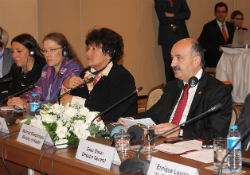Translating evidence into effective public health policy

Yanki Travel
Copenhagen and Izmir, 7 October 2013
WHO/Europe is taking steps to improve Member States’ ability to use health information to create an evidence base for crucial public health questions. The Autumn School on Health Information and Evidence for Policy-making, a joint venture between WHO/Europe and the National Institute for Public Health and the Environment (RIVM) of the Netherlands, is taking place on 7–11 October 2013 in Izmir, Turkey. Alongside it, the first workshop will be held of the multicountry Evidence-Informed Policy Network (EVIPNet), Europe. Today, the WHO Regional Director for Europe, Ms Zsuzsanna Jakab, and the Minister of Health of Turkey, Dr Mehmet Müezzinoğlu, officially opened the Autumn School.
Speaking of the venture, Ms Jakab said, “We live in an era of multiple challenges. Our Member States in the European Region lead the way in so many fields and have achieved many dramatic changes. Change demands courage and, in policy-making, courage comes from knowing you are doing the right thing. The implementation of the new Health 2020 policy depends on using the right information, and its impact will be measured by tracking progress over time. This is why the Autumn School and other capacity-building ventures are so significant, because participants will learn how to use evidence and translate it into confident, effective public health policy.”
Health information is required to assess a country’s health situation, develop interventions and evaluate progress towards objectives, as well as to underpin policy. Nevertheless, there is more to the story than just ensuring that health information and research evidence are available. A critical, analytical approach to common issues affecting quality, comparability and reporting is essential. The true challenge, however, is to foster the systematic use of health information and evidence in policy-making.
While many national and international organizations in the European Region are active in gathering, monitoring and reporting public health information, expertise is fragmented. According to Dr Claudia Stein, Director of the Division of Information, Evidence, Research and Innovation at WHO/Europe, the Autumn School and EVIPNet workshop will do vital work by tackling the central collection, integration and dissemination of information, knowledge, methods and examples of good practice that are otherwise lacking. The workshop’s aim is to educate and encourage participants to address the gap between research and policy-making, providing the skills and tools to translate evidence into policy.
“A great example of what can be achieved when there is a solid evidence base is tobacco control. Member States have had to stand up to the tobacco industry and take economically difficult and sometimes unpopular decisions in order to achieve a health objective,” explained Dr Stein. “A compelling body of evidence supporting such a decision makes it possible for public health authorities to do this with confidence, for ‘what does not get measured does not get done’.”
The Autumn School and workshop will be attended by professionals working in health information and analysis and those involved in the translation of evidence into policy.
For further information, contact:
Stephanie Brickman
Communications Consultant
WHO Regional Office for Europe
UN City, Marmorvej 51
2100 Copenhagen Ø, Denmark
Tel: +45 45 33 68 44, +45 40 87 48 76 (mobile)
Email: sbr@euro.who.int



